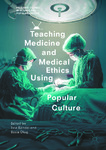Teaching Medicine and Medical Ethics Using Popular Culture
Abstract
There is an increasing awareness of the role of mass media and popular
culture in communicating health information to the general public
and medical students.1 Medical television series in particular have been
identified as a rich source of health information and medical ethics training,
depicting doctor–patient relationships that are both entertaining and
educational. Recent research has shown that these fictional representations
of the medical profession have an impact on perceptions of real-life
doctors, and can influence recruitment of students into medical, nursing
and health science degrees.2 Beginning with CBS’s City Hospital in
1951, medical television dramas have remained a staple of prime-time
television.3 In his book, Medicinema, Brian Glasser notes that popular
film culture and medicine have always been intricately connected, with
film historians placing the first representations of medical personnel in
fictional films before that of ‘cowboys, criminals or the clergy.’4

